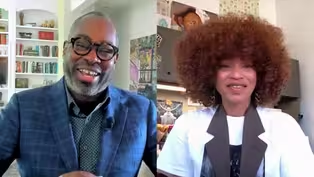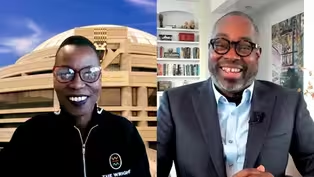
National Day of Racial Healing addresses effects of racism
Clip: Season 53 Episode 2 | 9m 6sVideo has Closed Captions
New Detroit, Inc. focuses on advancing racial equity for National Day of Racial Healing.
The National Day of Racial Healing, created in 2017 by the W.K. Kellogg Foundation, is observed annually on the day after Martin Luther King Jr. Day. The day focuses on addressing the ongoing effects of racism. Marshalle Favors, Director of Community Engagement at New Detroit, Inc., talks with host Stephen Henderson about the importance of the day in promoting racial healing and equity.
Problems playing video? | Closed Captioning Feedback
Problems playing video? | Closed Captioning Feedback
American Black Journal is a local public television program presented by Detroit PBS

National Day of Racial Healing addresses effects of racism
Clip: Season 53 Episode 2 | 9m 6sVideo has Closed Captions
The National Day of Racial Healing, created in 2017 by the W.K. Kellogg Foundation, is observed annually on the day after Martin Luther King Jr. Day. The day focuses on addressing the ongoing effects of racism. Marshalle Favors, Director of Community Engagement at New Detroit, Inc., talks with host Stephen Henderson about the importance of the day in promoting racial healing and equity.
Problems playing video? | Closed Captioning Feedback
How to Watch American Black Journal
American Black Journal is available to stream on pbs.org and the free PBS App, available on iPhone, Apple TV, Android TV, Android smartphones, Amazon Fire TV, Amazon Fire Tablet, Roku, Samsung Smart TV, and Vizio.
Providing Support for PBS.org
Learn Moreabout PBS online sponsorship- The ninth annual National Day of Racial Healing is gonna take place on January 21st, which is the day after the Martin Luther King holiday.
This annual observance is presented by the W.K.
Kellogg Foundation, and it's an opportunity for organizations all across the country to hold events that celebrate our common humanity.
This is a topic that is at the core of work that's done by New Detroit Incorporated, which was the nation's very first racial equity organization.
I spoke with Marshalle Favors, who is New Detroit's director of community engagement about the importance of this National Day of Racial Healing.
Marshalle favors, always great to see you.
Welcome back to "American Black Journal."
- Thank you so much for havin' me, always great to be here.
- So we're comin' up on the ninth annual National Day of Racial Healing.
Tell me what this is about, and I guess what the concept is here.
Why do we need a National Day of Racial Healing?
- Well first of all, let me say, it's definitely an event that I look forward to every single year, and my organization, New Detroit, looks forward to.
And the W.K.
Kellogg Foundation actually started the National Day of Racial Healing back in 2017.
And it was building on their work for Truth, Racial Healing and Transformation initiative that they have.
And it takes place every Tuesday after Martin Luther King Day.
So this year, it will be January 21st.
I love it because it is a national event, it takes place across the cities across US, on a national and local level.
And local organizations host gatherings and events to basically learn how we celebrate our common humanity.
So that's why it's really important.
- Yeah.
It seems like right now, especially right now maybe, this has a particular resonance.
I think when I talk to people about just the general division in the country, they are more concerned about it, they're more aware about it than they normally are.
But of course, inside that general division are these other kind of inflection points.
And racial division, it seems to me, is kind of flaring up again as yet another way in which we just can't find a lotta common ground as Americans.
- Yeah, absolutely.
And I think that's why this day is just spot on in terms of the timing of it, because it's really a day that we're focusing on unity.
Not the divisions that we have, but finding real safe places to have authentic dialogue about the multiple divisions that we have.
And so, it couldn't come at a better time.
- Yeah, yeah.
So let's talk about the work that New Detroit does.
I'm not sure everybody is always familiar with that work.
Of course, this is an organization that was begun after the '67 Rebellion, here in Detroit.
And its focus, really, is on the idea of bringin' people together.
- Absolutely.
So I know that our work at New Detroit aligns with the National Day of Racial Healing.
We're a racial justice organization, and racial justice and racial healing, they basically go hand in hand.
So our mission is to dismantle racism, and we kinda achieve that by tryna change hearts and minds, policies and systems, in Southeast Michigan.
And if we wanna really envision communities that are free of racism, I think that when individuals feel like valued, and respected, and celebrated, that having events like this is a way for us to have authentic dialogue, build trust with one another, and I think just most importantly, really grapple with the complexity of the history that we have in our country about racism.
And we don't always have a forum to have these dialogues.
- Mm-hmm.
- And so over the years, we've been a part of the National Day of Racial Healing by hosting like town halls, having conversations on race.
And so this is just another extension of what's gonna happen this year.
- Yeah, yeah.
So let's talk about what is happening locally with the National Day of Racial Healing, what New Detroit is gonna be up to that day.
- Well, we are going to participate, well, as participants.
So we are helping to spread the word, get the word out, and really encouraging other people to take part in it as well.
We have had recordings of our past town halls that specifically focus on racial healing, so we're gonna re-air those.
And we're encouraging everyone also to kind of either participate in the local events, because like I said it happens nationally, but locally, there are events happening as well.
And people can sign onto the website in order to learn what's happening locally.
- So you know, I also always feel like it's important to emphasize the reach that each of us as individuals has in this area, right?
I think it can be really frustrating to think about on a national level, for instance, racial division or racism or the things that really divide us or hold us back.
Because any one of us kinda feels like, well, what can I do about that, right?
I'm one person, I'm not in charge of things, I don't have the power to make everything different.
But I always think it's important for all of us to kinda look around our own spaces and in our own lives and kind of identify those places where we do have agency, where we do have say and power.
And all of us do have those spaces.
I mean, it seems like this is a great day for people to take stock of that and think about what you can do differently or who you can reach out to in a way you haven't before that moves toward this idea of better dialogue, better interpersonal relationships, you know, less division among races.
And right here, in Metro Detroit, I think all of us have those things in front of our faces every day, and we don't take advantage of 'em.
- I'm so glad that you brought that up because a lotta times, we look outside ourselves, and as you said, we deal with these big issues and problems that we have, but really looking inward and saying, you know, what can I do to be a part of it?
And one of the things that we can do is having conversation, having dialogue, especially with people who don't look like us, who have different perspectives.
And you can start with your neighbors, your friends, even if you're not attending a big event in an auditorium, things like that.
It starts with the personal.
And I feel like people are looking for more ways to connect better with people and individuals.
And we talk about like the systems, right, systemically, what is going on.
But systems are made up by people, and it has to start with the individual and looking inwardly and saying, what are my perspectives as it relates to our history, our race, my community.
And then looking and saying, what can I do as an individual to help create a more equitable society and to make a difference?
- Yeah, yeah.
Okay.
Marshalle Favors, great work as always at New Detroit, and we look forward to the ninth annual National Day of Racial Healing.
Thanks for bein' with us.
- Thank you for having me.
Detroit artist’s James Baldwin exhibit at The Wright Museum
Video has Closed Captions
Clip: S53 Ep2 | 9m 16s | Detroit artist Sabrina Nelson’s “Frontline Prophet: James Baldwin” exhibit at The Wright. (9m 16s)
The Wright Museum hosts celebration for MLK Day 2025
Video has Closed Captions
Clip: S53 Ep2 | 5m 16s | The Wright Museum hosts its annual celebration for Martin Luther King, Jr. Day 2025. (5m 16s)
Providing Support for PBS.org
Learn Moreabout PBS online sponsorship
- News and Public Affairs

Top journalists deliver compelling original analysis of the hour's headlines.

- News and Public Affairs

FRONTLINE is investigative journalism that questions, explains and changes our world.












Support for PBS provided by:
American Black Journal is a local public television program presented by Detroit PBS

